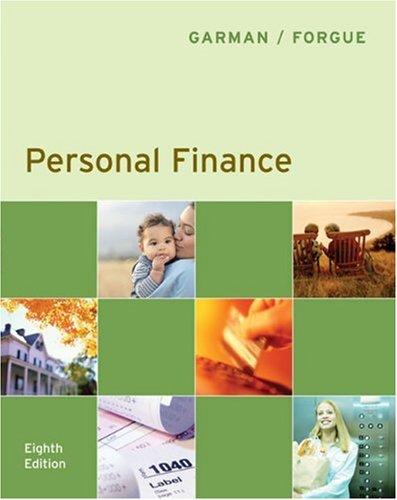Question
Can someone please help me with Federal Income tax accounting The timing of when the economic performance test is satisfied depends on the type of
Can someone please help me with Federal Income tax accounting
The timing of when the economic performance test is satisfied depends on the type of transaction and whether the transaction is recurring.
| a. | When does economic performance occur for a taxpayer who must provide property or services to another person? |
| b. | When does economic performance occur when another person provides the taxpayer with property or services? |
| c. | Explain the exception to the economic performance test for recurring liabilities. |


An exception to the economic performance test provides that taxpayers may ???? if certain tests are met.
A. Take a current deduction for recurring liabilities
B. Capitalize recurring liabilities
C. Amortize recurring liabilities over three years
Requirement c. Explain the exception to the economic performance test for recurring liabilities. An exception to the economic performance test provides that taxpayers may take a current deduction for recurring liabilities if certain tests are met. Identify the tests that must be met to meet the exception to the economic performance. (Select all that apply.) D A. The expenses have been paid in the current year. B. The expenditure creates an asset having a useful life that extends substantially beyond the close of the tax year. I C. Economic performance occurs within the shorter of (a) 3 1/2 months after the close of the tax year, or (b) a reasonable period after the close of the tax year. D. The item is material and the revenue associated with the expenditure has not been earned in the current year. D E. Either the item is not material or the accrual of the item in the tax year results in a more proper matching against income than accruing the item in the tax year in which economic performance occurs. OF. The expense is recurring and the taxpayer consistently treats the item as incurred in the tax year. O G. Economic performance occurs within the shorter of (a) 8 1/2 months after the close of the tax year, or (b) a reasonable period after the close of the tax year O H. The all-events test is met during the year. The recurring liability exception applies only to the following transactions: (Select all that apply.) A. The revenue associated with the expenditure is not recognized in the current year. B. Another person provides the taxpayer with property or services. OC. The taxpayer must collect payments for services rendered. D. The taxpayer must make payments to another for rebates, refunds, awards or prizes, insurance or service contracts, or taxes. O E. The taxpayer must provide property or services to another person OF. The taxpayer must depreciate the asset acquired. O G. The taxpayer uses property. Requirement c. Explain the exception to the economic performance test for recurring liabilities. An exception to the economic performance test provides that taxpayers may take a current deduction for recurring liabilities if certain tests are met. Identify the tests that must be met to meet the exception to the economic performance. (Select all that apply.) D A. The expenses have been paid in the current year. B. The expenditure creates an asset having a useful life that extends substantially beyond the close of the tax year. I C. Economic performance occurs within the shorter of (a) 3 1/2 months after the close of the tax year, or (b) a reasonable period after the close of the tax year. D. The item is material and the revenue associated with the expenditure has not been earned in the current year. D E. Either the item is not material or the accrual of the item in the tax year results in a more proper matching against income than accruing the item in the tax year in which economic performance occurs. OF. The expense is recurring and the taxpayer consistently treats the item as incurred in the tax year. O G. Economic performance occurs within the shorter of (a) 8 1/2 months after the close of the tax year, or (b) a reasonable period after the close of the tax year O H. The all-events test is met during the year. The recurring liability exception applies only to the following transactions: (Select all that apply.) A. The revenue associated with the expenditure is not recognized in the current year. B. Another person provides the taxpayer with property or services. OC. The taxpayer must collect payments for services rendered. D. The taxpayer must make payments to another for rebates, refunds, awards or prizes, insurance or service contracts, or taxes. O E. The taxpayer must provide property or services to another person OF. The taxpayer must depreciate the asset acquired. O G. The taxpayer uses property
Step by Step Solution
There are 3 Steps involved in it
Step: 1

Get Instant Access to Expert-Tailored Solutions
See step-by-step solutions with expert insights and AI powered tools for academic success
Step: 2

Step: 3

Ace Your Homework with AI
Get the answers you need in no time with our AI-driven, step-by-step assistance
Get Started


